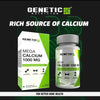
The role of Calcium in bodybuilding
, by SEO DIGITAL, 3 min reading time
Stay tuned, Your Favourite supplements will be back in stock soon!
Stay tuned, Your Favourite supplements will be back in stock soon!
Stay tuned, Your Favourite supplements will be back in stock soon!
Stay tuned, Your Favourite supplements will be back in stock soon!
Stay tuned, Your Favourite supplements will be back in stock soon!
Stay tuned, Your Favourite supplements will be back in stock soon!
Stay tuned, Your Favourite supplements will be back in stock soon!
Stay tuned, Your Favourite supplements will be back in stock soon!
Stay tuned, Your Favourite supplements will be back in stock soon!
Stay tuned, Your Favourite supplements will be back in stock soon!

, by SEO DIGITAL, 3 min reading time

Calcium is a micronutrient and a mineral that is necessary for good health. Many of you are probably aware that calcium is vital for strong bones and teeth, but it also serves many other functions in the body that make it an important factor, particularly for bodybuilders.
Lifting weights causes adaptations that result in improvements in muscle size as well as increases in bone mineral density. Given that our bones are primarily responsible for supporting our muscles and transmitting the forces they generate into movement, it would be counterproductive if our muscles become stronger while our bones (ligaments and tendons) do not improve their load-carrying capacity.
Although calcium is strictly regulated in the body, it can be released from its major storage form, calcium phosphate in bones, to assist maintain blood PH levels and keep us healthy, particularly if we have a high dietary acid load. If we consume a lot of foods that contain acidic chemicals (for example, meats and grains), it has the ability to impact our blood PH and make it more acidic, which could be problematic. Yet, because of this 'buffering system' (and a number of others), our blood PH is closely controlled (between 7.35 and 7.45), and diet has no significant impact on our blood PH.
This appears to have the potential to induce bone loss, but our bodies respond by reabsorbing calcium back into the body and thus the bones to prevent severe bone mineral loss. However, given the increased dietary acid load from the foods bodybuilders typically consume, as well as the fact that we will need to develop new bone tissue, it is prudent to ensure that they are getting adequate calcium in the diet, or through supplementation, to meet this demand, in addition to plenty of greens and vegetables that contain organic phosphates, which also help to buffer acid load.
Given a diet rich in dairy and calcium-rich foods (green leafy vegetables, nuts, fortified cereals), calcium supplementation is rarely necessary for bodybuilders to maintain bone health; nevertheless, if calcium supplementation is used, it must be combined with vitamin D3. This allows the bones to use calcium more effectively, and research suggests that vitamin D3 is even more vital for bone health for this reason. Many athletes have been shown to be deficient in calcium and vitamin D, thus calcium and vitamin D may be beneficial to bone health and performance for those who do not get enough sunlight.
Apart from its structural roles in bone and its ability to buffer any acidic load in the body, calcium also plays an important role in muscular action, acting as a secondary messenger that transmits our nerve impulses into the muscles and allows our muscles, including the heart, to contract. As a result, we must ensure that enough calcium is present in our diet in order to perform at our peak.
The recommended amount of calcium in the diet is 700 mg-1000mg per day, which is normally easily reachable from a balanced diet, and larger quantities are not usually required for athletes due to the body's ability to manage calcium levels. For example, 250ml of milk contains around 250 mg of calcium, 100g of broccoli contains approximately 50 mg of calcium, 100g of peanuts provides approximately 100mg, and whey protein contains approximately 100 mg per 30g dose.
Calcium supplements are most commonly offered in the form of coral calcium (calcium carbonate), but calcium citrate, phosphate, and gluconate are also available. Calcium carbonate is generally well tolerated and absorbed in doses of 500mg, with higher doses recommended to be divided throughout the day to maximize absorption. It is also recommended to take calcium supplements with meals to slow gastric transit and allow for higher absorption.
Supplementation is typically available in 250-1000mg capsules but is also available in powder form and is commonly coupled with vitamin D, zinc, magnesium, and other critical elements that are also important for bone health, such as found in Garden of Life's RAW Calcium supplement.